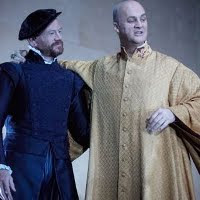We're in the 16th century and Venice has just had a major naval victory over the Turks. A 100-foot painting of the battle has been ordered to celebrate the victory, and the Doge Urgentino (Tim McInnerny) has pushed for the controversial artist
With the strength of feeling against Tom Cairns' production, Richard and I went into it mainly wondering if we would make it to the end (and I figured if I did get bored, at least I could entertain myself with the fact that one of the characters was called Lasagna, and hope Lucas Hare gave him a multi-layered performance.) As it happens although there are dull moments in the show and it won't be threatening my list of favourites, I once again struggled to see what had caused quite that strength of feeling against the production. Shaw is a natural choice to play the spirited but quite self-destructive
Richard mainly came along because he wanted to see Shaw on stage, and he said she lived up to his expectations, although he hadn't been planning on seeing quite so much of her -
McInnerny is also interesting as the art-loving Doge, a largely comic performance as he's unable to find the right balance between leaving the artist alone and interfering, but sometimes displaying a sudden menacing side as we're reminded of the political power he wields, and the ruthlessness he will have demonstrated to achieve it. His brother the admiral plays a central role in the painting, and it's funny to see Propeller regular Robert Hands playing a man weirdly fixated with his own hands, of all the things an actor with that name could end up playing. The set is a bulky affair of massive, rotating blank canvases (that's apparently also been causing its own share of grief with technical problems, though not tonight) so it's no huge surprise to see Hildegard Bechtler is behind the design, which also uses a transparent curtain to give some idea of the eventual painting's scale (we never see the end result itself, though parts of it and other paintings are sometimes represented by actors in tableau.)
I can't say there aren't dull patches to Scenes from an Execution but it's certainly not the disaster I was expecting, and makes its points without ramming them home as much as the writer's outside comments might make one expect. I would say that by the interval I felt like I knew what the play had to say, so perhaps in that sense it might not be a show that people are desperate to return to after the interval; but at least the second act moves the story on, with
Scenes from an Execution by Howard Barker is booking in repertory until the 9th of December at the National Theatre's Lyttelton.
Running time: 2 hours 25 minutes including interval.




No comments:
Post a Comment